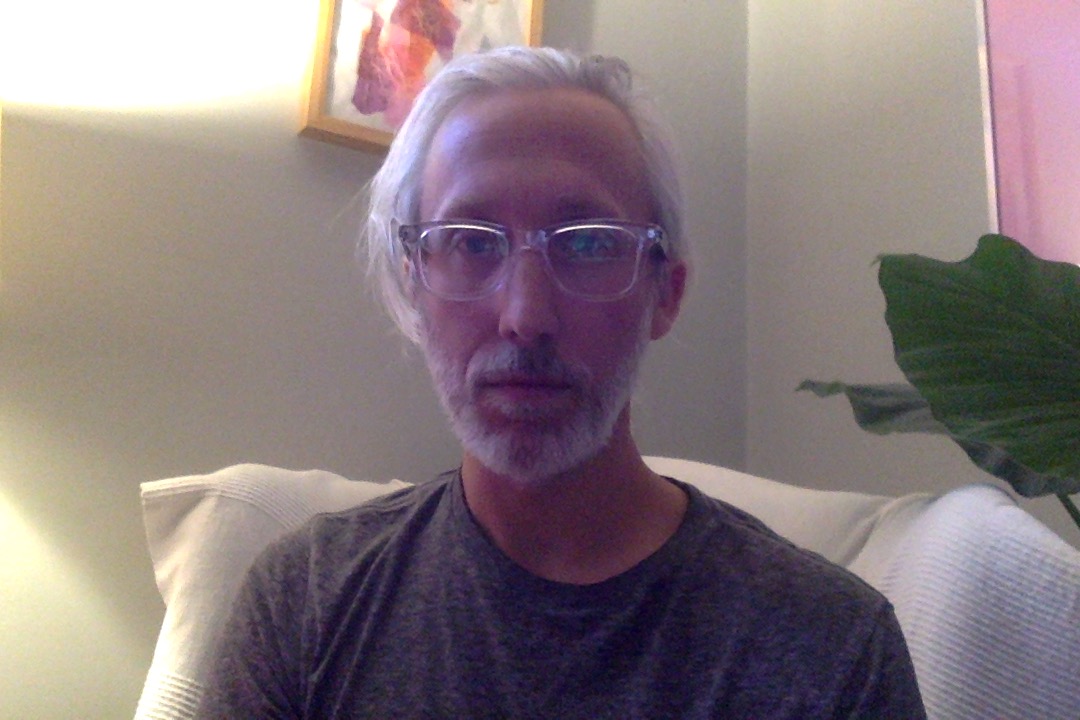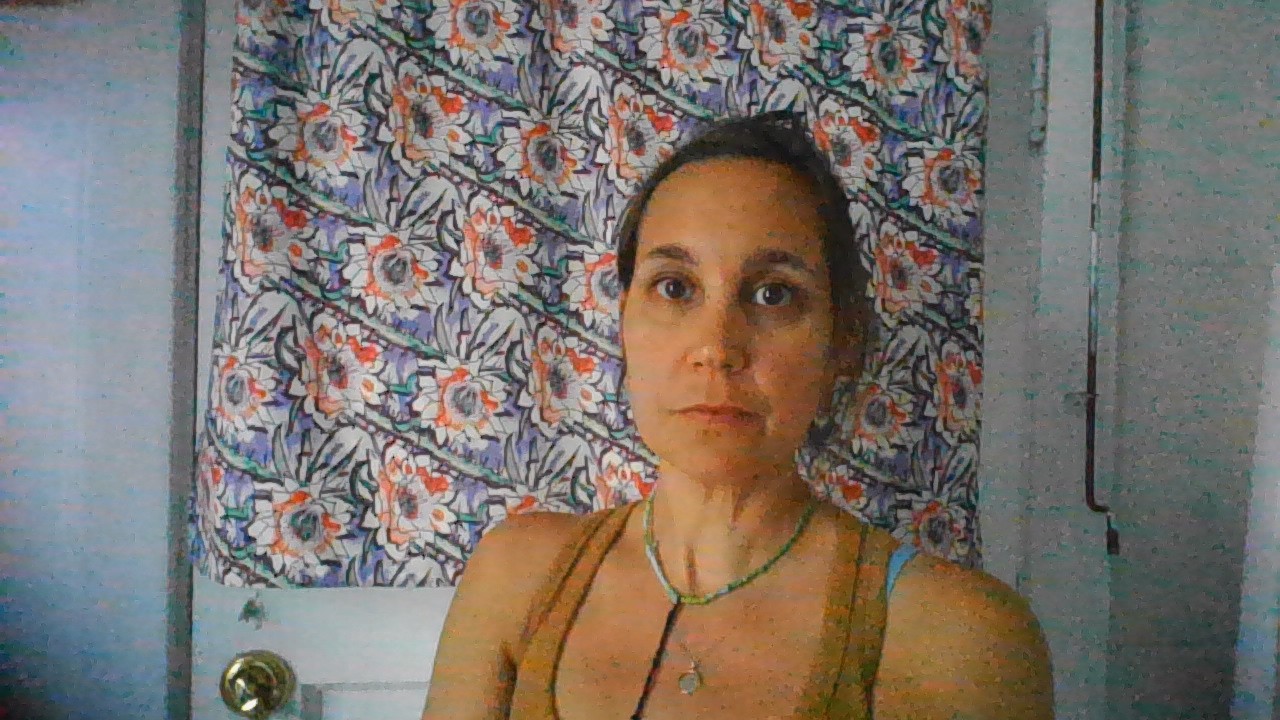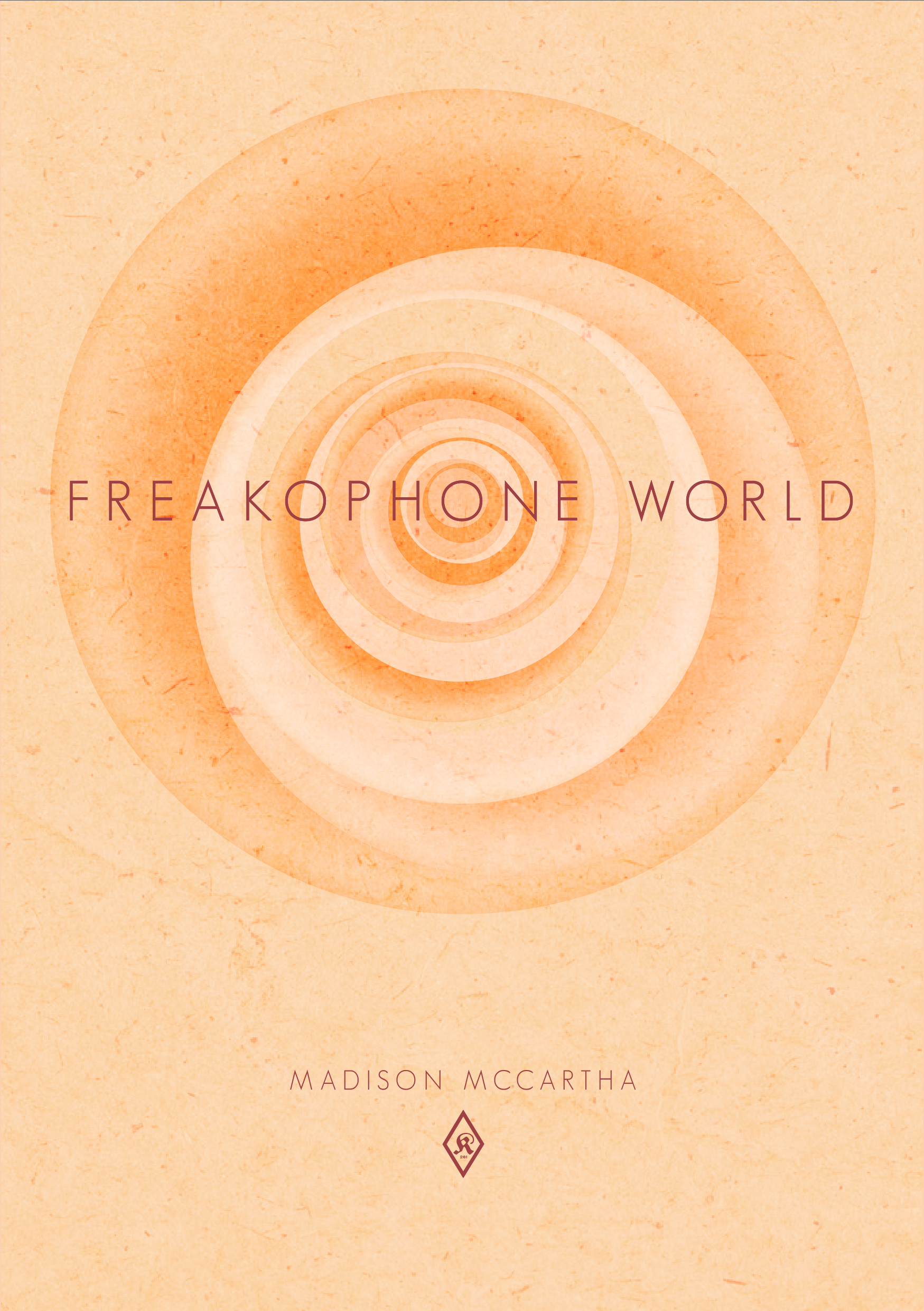Madison McCartha
Freakophone World
Inside the Castle, 2021
Full color paperback, 142 pgs.
Madison McCartha’s Freakophone World is riding the released gas of betweenness.
Freakophone World tinkers with gerund and adjective overlaps the way a tunnel is a worm and the way that, pulling here from Will Alexander’s (Action Books, 2022) The Contortionist Whispers, “[o]ne sonically dissolves into zones infused by the plenitude that is mystery.”
And Freakophone World variously invokes Édouard Glissant’s Poetics of Relation (University of Michigan Press, 1997). A truncated passage from the fourth section of Glissant’s book serves as an epigraph for McCartha’s: “The position of each part within this whole […] each specific Plantation […] to understand the hidden order […] so as to wander without becoming lost”; McCartha’s title, moreover, seems a play on the “Francophone” world that Glissant explores; and McCartha vibrates with Glissant’s views on relation, placing the errant-nomadic over the “arrowlike” incursion. Here, relation is privileged over the monolingual, over the imperial root that finds foundation in myth or filiation. McCartha writes errancy, free from disorientation, a body in space.
Freakophone World argues for the subsumed self (an entity of betweenness, “cramped,” like a loyal and hyper-visible hyphen) as the same entity as the subsuming self . . . from a page that is unquotable because it is actually a manipulated paint surface: “the Freakophone World / the called out edges / outside myself / so hard to think / outside myself . . .”
Freakophone World is anti-surface simply because all surfaces collapse into a kind of wearable voice. It’s also “anti-thread.” It’s somewhat tunnel, somewhat worm; it wraps and warps. It’s a hole? It’s into. It’s on.
This thing is “living / text-to-breech . . .” Subsumed and subsuming.
The speaking-body engages (or relates to) the reader and to a “you” that is mocked, is dunked on; the second person is a place for antagonisms, but also “outside myself,” where it’s hard to think: the eyes and nose and mouth as a confrontation; as an “I” turning a corner, and a there-it-is, “what?”; everything becomes its own cadaver, its own imago, maybe even its own larval-ghost.
McCartha’s technique for working up the “called out edges” is shit-talk, one of the most volatile poetries. (There’s probably room to think about it in conversation with Chelsey Minnis’ Baby I Don’t Care (Wave, 2018) and the trio of books from Ursula Andkjær Olsen/ Katrine Øgaard Jensen–I’ve actually wanted, before, to think about/ write about those texts as poetry endurance documents . . . and now I’m thinking about shit-talkers as endurance linguists, Freakophone as a gooey mouth hole releasing the hot air like riding theremin-waves.)
I remember with discomfort and admiration how a certain kind of grade-school kid can shit-talk; the shit-talk makes itself felt under and over the dominant (i.e. authority’s/ bourgeois civility’s) sound. But audible. Quite audible. The shit-talk hangs around like some funny but threatening chunk that can bop between stalactite and stalagmite. If dominant sound too is a kind of tunnel, a worm, then there’s room to make it wormed through, or it gets sucked into a freakophonic tunnel:
oh hello
i was just
thinking of you
your lumpy face
Or “listen twerp.” “[L]isten nothing-special-freak-who-is-all-the-time- / finding-me . . .”
McCartha’s text shit-talks its way through and on top of its holes:
for a thimble-breath of darkness
outside the sentence
i lift the veil
so my nematode-
sprites can get a whiff of empire–
It’s under us. It’s relying on nerve. It’s riding the waves, the gas of it.
McCartha makes a space for peering-as-listening, maybe?
The speaker asks, “lots of losers wanna know // what it’s like / being a needle boy,” which suggests the currents of fucking, domination, pleasure, no-tomorrows that turn under the book, and that offer a confrontation between the reader and the speaker or the speaker and the “you.” That exchange (speaker and reader or you) launches outward into the three-dimensional, becoming a three-dimensional parade of language moving visually across the page. And this episodic three-dimensionality suggests throats and caves, the subterranean and gusts of wind. An alien landscape or the cellular movements of little biological bits: “getting sucked / our gray / beggarbodies / greeting coastline . . .” It means as it passes by us, as if we, observers (“what?”), were perched by a stream or outflow, watching the language rush around a corner and disappear, down an artery, through a cavern, out an ass: “so stinky!”
The speaker has a “hypoglossal tongue”: a tongue sub-tongue, more nerve, a body under the body, like a word play or a misunderstanding (or inserting some shit-talk under the radar of the authorities!), the ghost that haunts every syllable, and the threat of violence talking under every exchange:
i bet you think
every winking spook-hole
cares what you do where you go
that the violence of
this voice
has a body scraped or unscraped clam
& it’s true
Back to Will Alexander as a complement or companion or “snout” to this text: “one inherits the grammar of voltage, partaking of intervals, of suspension and camouflage, that initiates great perplexity through mystery.”
Back to up and under and over: what if Freakophone World is a study guide for understanding Overtone singing (controlling layers of amplitude?) vs. Undertone singing (inverting the overtone via vibration?)? Where the two sonic fabrics meet: a hyphen: “that plush- / polyp quaking in the corner / you can call him rabbit-rabbit . . .”
Our demon (“earwig-demon,” “slug-demon”) or post-dead creature-speaker, a transmission from the underworld, is a rainbow full of arms and legs and slime. The speaker is really wormy. The speaker is sardonic and seems to haunt the second person:
it’s so busy
being alivein the land
of the dead
McCartha revels in (squirms! worms!) the pleasures of being a ghoul. They must have it made! Those ghouls sure do have it all figured out! Moving errantly through the world, without ever being lost in that world, a specter is like a stone or a bird in its nest: between everything, between and between, an “infraspook.”
Those slime planets and planets full of wild-west mannequins or whatever, and so on, and in this book, we see blood rushing this way and that, all capillary, everything moving, all weird: it’s in the blood, it’s microscopic, it’s in words, and what happens over the ridge in another place, elsewhere, where the sludge is getting thicker; it’s pooling. In other words, this is biology, “THE FECULENCE OF / THE LIVING & / THE DEAD,” and it’s the meaning in biology, that is to say in certain well-selected fonts that tell us that this is, indeed, a planet full of vampires.
What are the physical, material effects of spirits? What do ghosts do for a meal? What is a body in relation to a non-body? What is in-between? Observe how spirits and demons and such are corporealized, must have a biology. Observe how this tradition is everywhere (prominently) in the epic tradition and in medieval illuminations, and in fantasy and in horror (“We have such sights to show you,” Pinhead and etc.), in schlock and etc.
We are with freaks and in freak speech. The hyphen is a between, a tongue perhaps. The hyphen makes everything hybrid, molecular, or like little bio-bits congealing, turning growing: how linking together two nouns creates a new thing, a landscape, a “plasticine-field.” Hyphen logic. Noun hyphen noun as a freakworld maker. Or, as Glissant (translated here by Betsy Wing) discusses regarding his use of the hyphen between “common” and “place” (“lieu-commun”), “[W]e open the linguistic bastion and in turn multiply the language that we inhabit; we open stars into it: into a use-language that, by shortcutting, reassembles the language and scatters it.”
Thus, McCartha, in their use of the hyphen and neologism, engages in a shortcutting and an opening: they are drawing things into themselves. This is rather like currents of oil on the surface of water, or the pneuma, things bursting into categories, gaining faces, speaking in categories, turning monolingual, slipping into endless new shapes, perfection-deformations, new faces, new faces. “i take my oily forgiveness cloud for a walk . . .” No hyphen needed there!
And the language that emerges, here, seems to pass down a bore hole in an apple, a hole bored by a worm, a long baroque hall, the baroque itself, the movement of sewage, exhalation. A book of baroque worminess! Hey!
have a municipal
complaint?you can feed it
to my corpse-body’s
pre-creamed-rectum–
LOL motherfuckers.
And there is the “freakoscope,” which suggests in John Trefry’s technical drawings and McCartha’s poetic language how we might get in and get lost, a way outside by staying in, or just “combusting.” It’s the way that all words are moving down in a silting process, becoming just one word, through their little atomic attractions and aversions. Growing like “lickpans” and “crownshatter” and “crowheart” or maybe just like “netherworld” or “sadnesses.”
Toward the end: painted pages with no more words, or: the flashing drips are the words. Two text-based pages that collide at their “bottoms” to form a syntactical enactment of hyphen and are elsewhere scattershot with fragmented, holed-through/ wormed-through, starred and flashing in and out like-a-Lite-Brite-board-with-worms-for-lights incomplete “if” clauses–“if an itch,” “if i fit,” “if arrival” . . . and one possible reading: “if people changed / look me in my big blind lidless eyes white as filth / & tell me i am found . . .”
McCartha has written an erotics of bodies smashing together, of words colliding. These are not only “human” bodies. In fact, not human at all: this is about uncanny bio-flotillas, cadavers, trash, and technology: about getting outside of oneself, while still keeping one’s ability to speak: a talking wall, a grub, a slime mold, some kind of free-floating memory, or (possibly most especially) virtual reality. All of this, too, is predicated on and happening in ecological catastrophe: this is the erotics of collapsing ecosystems and the rise of squid-ruled seas.


Olivia Cronk is the author of WOMONSTER (Tarpaulin Sky, 2020), Louise and Louise and Louise (The Lettered Streets Press, 2016), and Skin Horse (Action Books, 2012). She lives in Chicago, IL and teaches at Northeastern Illinois University.
